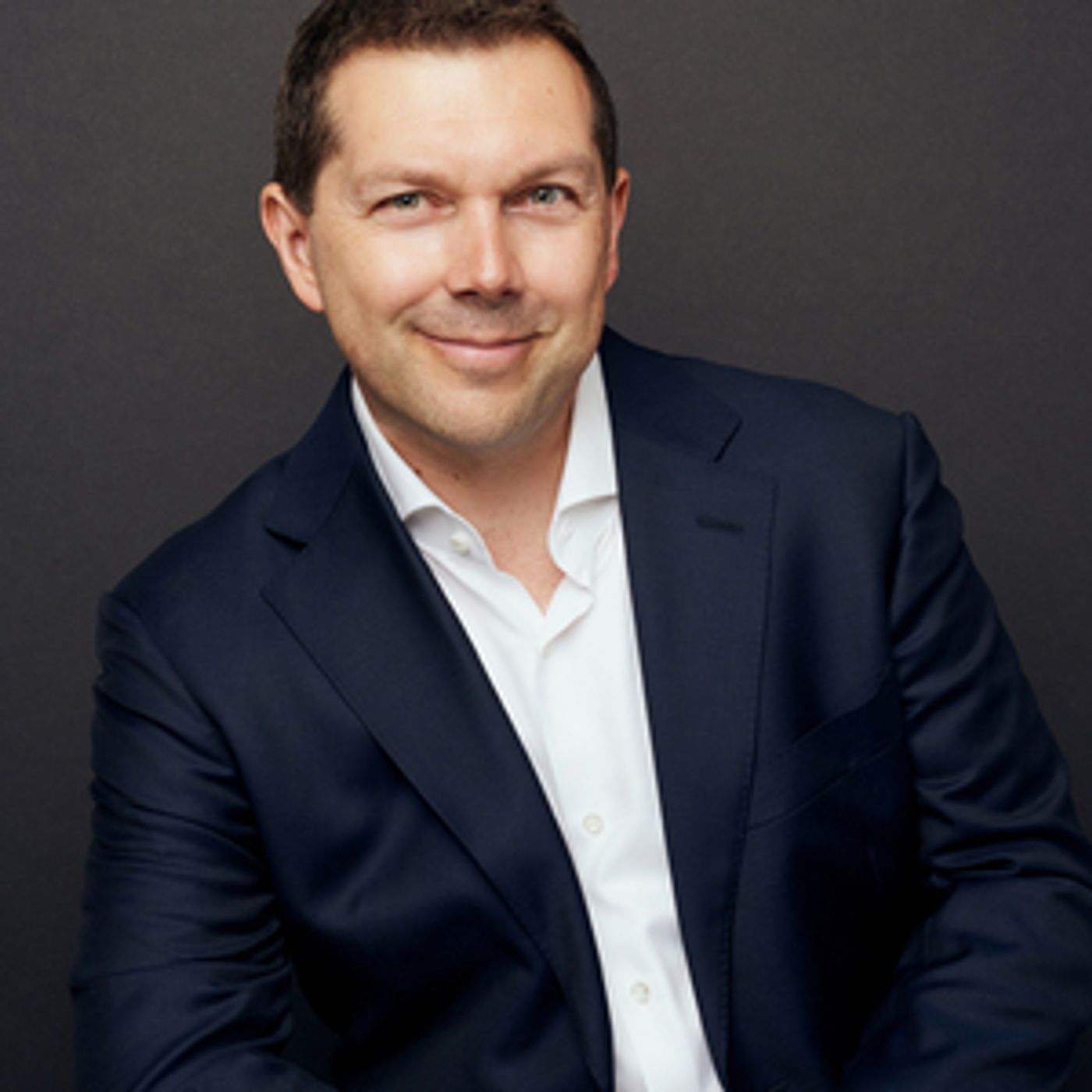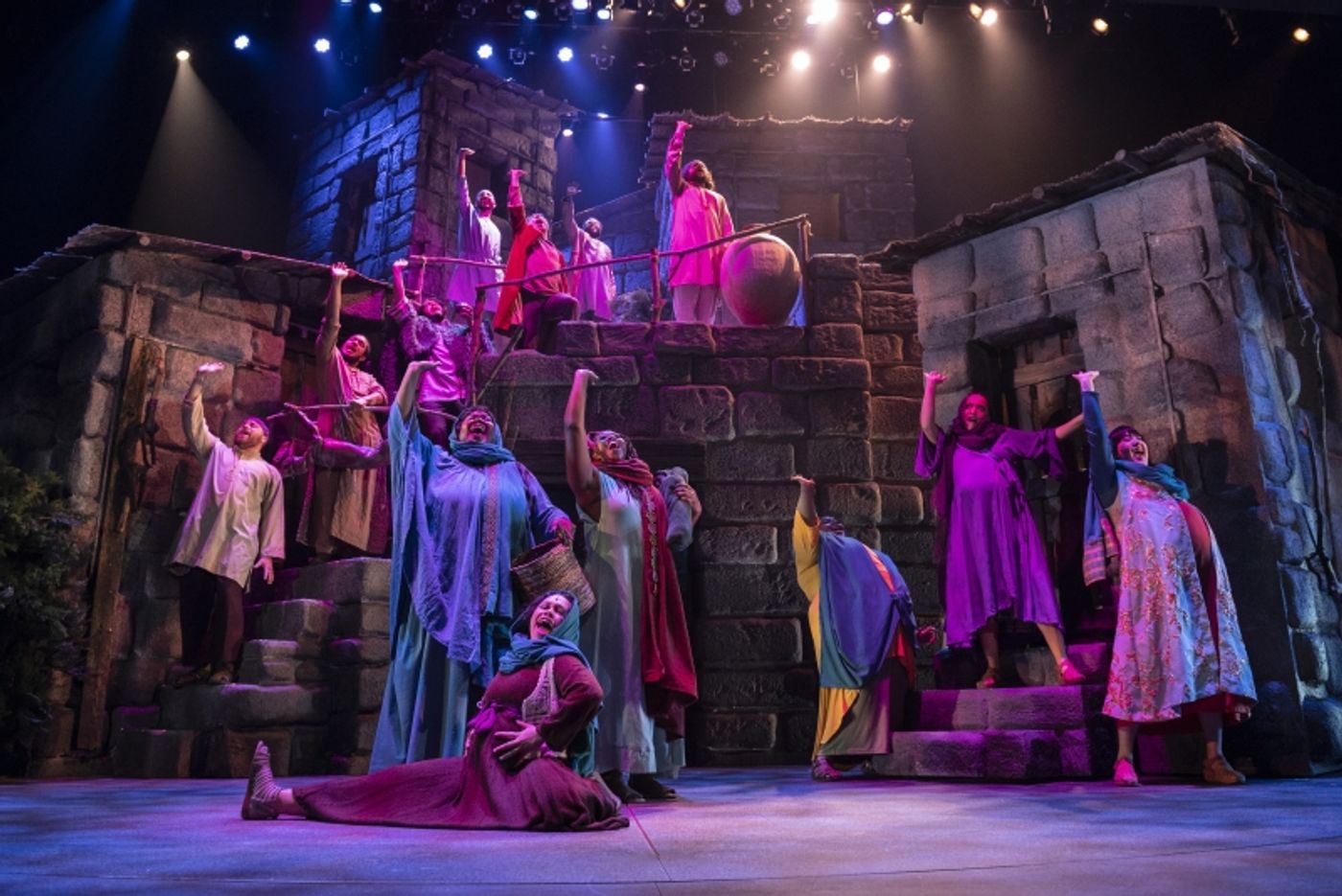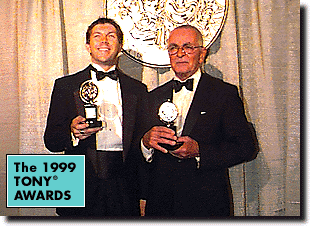Interview: Theatre Life with Doug Besterman
The Tony Award winning orchestrator on his latest project A.D. 16 and more.

Anyone that has read my reviews or columns over the years knows that I always pay attention to the orchestrations and orchestrator of any given musical. Let's face it, without the orchestrator, the score is only a piano.
Today's subject Doug Besterman has been living his theatre life for many years as an orchestrator for Broadway, regional, and West End theatre as well as doing scoring for films and TV.
His current project is the World Premiere musical A.D. 16 where he serves as musical supervisor and orchestrator. This BRAND-NEW musical is running at Olney Theatre Center now through March sixth.
Locally you might have heard Doug's awesomeness on Girlstar at Signature Theatre or Little Dancer (co- orchestrator with Larry Hochman) at Kennedy Center.
Over Doug's long and distinguished career, he has been lucky enough to have worked on some of Broadway's biggest hit shows. A few select credits include The Producers, Fosse (alongside legendary orchestrator Ralph Burns), Damn Yankees, How to Succeed in Business Without Really Trying, A Bronx Tale, Big, and Thoroughly Modern Millie (completing the show for Ralph Burns after his passing).
His work on Fosse and Thoroughly Modern Millie was rewarded with two Tony Awards for best orchestration.
Off Broadway credits include Johnny Pye, The Gifts of the Magi (added a percussion book after many years of the show just having a lone piano), and Weird Romance.
His film work includes Chicago, The Producers, and the live action version of Disney's Beauty and The Beast. For television his work was heard on the NBC TV series Smash, Peter Pan Live, The Sound of Music Live, and most recently Apple TV's Schmigadoon.
He can be seen in the PBS documentary entitled The Producers: A Musical Romp with Mel Brooks which chronicles the recording session of that juggernaut Broadway hit show.
With Dean Pitchford he composed the music for The Big One-Oh.
Doug Besterman is a master of his craft and has been for over thirty years now. Please consider making a trip out to Olney Theatre Center to A.D. 16 to hear Doug's latest work of brilliance. If you know his work from years of listening to Broadway cast albums you won't be surprised by the results. If this is your first time hearing his work, get ready to be impressed. This is a man who has been living his theatre life to the fullest and I'm sure is going to continue for a long time.
At what age did you get interested in music?
My earliest memory of an interest in music was at age 5 - we had music class and the teacher played a record demonstrating the sounds of the instruments of the orchestra - and I remember thinking "pay attention, you need to know this." I had asked my parents for piano lessons at around age 4, but the teacher said my hands were too small - I think I started at around age 5.
Where did you receive your musical training?
I had very good teachers growing up - an amazing classical piano (Ludmilla Berkwick) and then jazz piano teacher (John Lampkin) - and fortunately, very good elementary, middle, and high school music teachers who noticed my enthusiasm and took a special interest in encouraging me. I also had a wonderful horn teacher (french horn was ultimately my primary instrument) - I learned so much about being a musician in my private lessons.
I formally studied music at the Eastman School of Music - my degree was a BA in Music History and Theory. I studied jazz arranging under Rayburn Wright - my horn teacher was Milan Yancich, and my piano teacher was Emily Vanderpool. These were all legendary figures at Eastman and I was fortunate to get to study with them.
Had you been working as a conductor/musician before becoming an orchestrator?
I came to New York directly after graduating, and worked first as an assistant, then as a musical director - also as a (very bad) audition pianist. I started a small business with a colleague that among other things created custom audition demos for singers - we used what at the time was state of the art gear to create orchestral mockups. Those were my first professional forays into arranging/orchestrating.
What was your first professional job either as a conductor/pianist/orchestrator or all of the above?
I did community theater in high school, but my first truly professional job was as the assistant musical director at Theater By the Sea in Matunuck Rhode Island. I still have many friends from that time. Jay Dias was the musical director and taught me a lot about working with singers - Tommy Brent was the producer and had great faith in 21 year old me - he offered me the full MD position two years later.
Technically, my first paid orchestration jobs were for two Off-Broadway shows at the Lambs Theater in NYC - a revival of Godspell, and a musical called The Gifts Of the Magi. But I consider Weird Romance for Alan Menken my breakthrough job.

World Premiere musical A.D. 16.
Photo by Teresa Castracane Photography.
Can you please tell us a little something about your current project A.D. 16 which is going to soon premiere at Olney Theatre Center?
A.D. 16 features music and lyrics by Schmigadoon composer/lyricist/showrunner Cinco Paul, and book by Bekah Brunstetter - Stephen Brackett is directing and Katie Spelman is choreographer. It tells the story of how teenage Jesus and Mary met in Nazareth (in AD 16 get it?) - the score is a delight and the book is hilarious. I have great hopes for it!
How do you best describe the show's score and what is the instrumentation for the orchestra?
The score is derived from 80's and 90's radio music, but through Cinco's musical lens - a totally unexpected choice, but it works perfectly. The arrangements are for 8 musicians - 5 piece rhythm section with playing conductor, and 3 horns. I'm also augmenting with Ableton (i.e. programmed) tracks - this has become very standard on Broadway in the past decade. Ableton will provide loops and other elements that allow me to use authentic sounds and production techniques from the musical era being referenced. Because this is a small production, I've done all of the Ableton programming myself - I'm very comfortable with that kind of technology, though you wouldn't necessarily know it from looking at my resume.

after winning the Best Orchestration Award for Fosse.
Photo courtesy of the artist.
You worked alongside the legendary orchestrator Ralph Burns on Fosse and Thoroughly Modern Millie. What would you say was the biggest lesson you learned about orchestrating from him?
Ralph and I met on Fosse - I hadn't known him or worked with him previously. It was decided early on that we would split the work and share credit - a generous gesture from someone so legendary and experienced. Beyond just being able to study his scores, I learned not to be precious about anything I wrote - Ralph handled changes and revisions with absolute aplomb - all he wanted was for the end product to be good. I also got to hear some of his stories from touring with Red Norvo and Woody Herman - those were something else.
Millie was Ralph's show (he had done the La Jolla pre-Broadway production)- he and Jeanine Tesori reached out before Broadway to ask me to stand by in case Ralph needed backup - he was having health issues and they were concerned he'd need help. When he passed away unexpectedly before rehearsals began, finishing the job fell to me - and I tried to respect the work he and Jeanine had begun.
In 1994 you orchestrated the revival of Damn Yankees. The musical genius vocal arranger/ conductor James Raitt died from AIDS shortly before the show officially opened. What do you remember the most about working with him on that show and if he were still here, where do you think his career would have gone?
James was the closest thing I had to an actual mentor - you could say he was a musical champion. I was lucky to have a few of those early on in my career (Danny Troob and Gordon Harrell were also in that category).
James had exquisite musical taste and a great sense of humor - to us, he was a larger than life figure (in his huge fur coat and driving his green Jaguar!). I first met James around the time he was doing Forever Plaid - my studio partner and I (Martin Erskine) helped with the Plaid cast recording - James took a liking to us and helped us both with our careers (I played Plaid briefly Off-Broadway - Seth Rudetsky helped me learn the show!).
What I loved most about James was his joyfulness about music - he loved sharing his musical references and taught us so much - David Chase was also in his circle and has similar stories. From James, I learned about Juan Esquivel, Raymond Scott, and the musical score from the cartoon show Ren and Stimpy - an eclectic list! The unique musical sound of that revival sprung straight from his mind - we were living in his musical world on that show! I have no doubt he would be a legendary Broadway musical director, vocal and dance arranger had he lived longer. What a loss.
With Broadway orchestras getting smaller and smaller, how does an orchestrator make a pit of 12 tops sound like 28 without it ever sounding synthetic?
Of course we now have the option of using electronics - but orchestrators use that technology differently and for different reasons. For me, the most important thing is to write PROPERLY for whatever size ensemble you have - that means having a thorough understanding the instruments of the orchestra, having a background in theory (i.e. counterpoint and proper voice leading) - and most importantly, having a vocabulary of styles to draw on. Orchestration is about making decisions very quickly - and the more styles you know, the faster and better you will write.
So when someone compliments me on making an "orchestra" of 12 sound like 28, I think to myself that I've successfully made an orchestra of 12 sound like a properly-written 12.
You have a career spanning over thirty years. If you had to pick a few of the highlights thus far, what would they be? Please explain your choices.
You mean which of my children do I love the most? Seriously...the highlights have mostly todo with the people and experiences - I've been fortunate to work with great composers and great scores. The Producers was obviously a highlight - getting to be in the room with Mel Brooks, Susan Stroman, Nathan Lane, Matthew Broderick et al as they were creating that piece - there will never be another experience like it. Mostly I learned what a serious business comedy is to write - Mel never rested until he had the kind of laugh he wanted - and neither did his collaborators.
Seussical was a joy - I just loved that score, and we had fun with sounds and musical styles with a (relatively) small band. I've really enjoyed the shows I've done with Lynn Ahrens and Steve Flaherty - they're like family to me. I adored their score for Rocky - we had an amazing musical experience in Germany, and despite the problems it had in NYC, it will always be one of my favorite experiences. What a band we had there. Anastasia too - gorgeous.
The shows I've done with Alan Menken are also highlights. Alan's shows are among the most tuneful and musically satisfying in the canon - starting with Weird Romance, then King David, Sister Act, and A Bronx Tale. Those are scores you can't get out of your head. Marc Shaiman too. Charlie and the Chocolate Factory was a delight - and of course the film Mary Poppins Returns - one of the most satisfying musical experiences I've ever had.
Of the shows that "didn't make it," I think the revival of On a Clear Day might have had some of my best work. And of course, that was the show that introduced Jesse Mueller to the world - what an incredible talent.
Theatre Life logo designed by Kevin Laughon.
Videos


.gif)